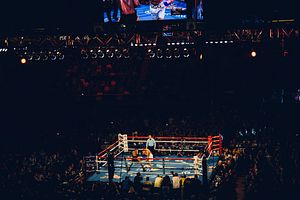Four days before the president of the International Boxing Association (AIBA) published a statement offering to step aside, amateur boxing’s governing body produced an ode to boxing as an olympic sport in the form of a blog.
“In fact, boxing is one of the oldest Olympic sports,” it begins before charting boxing’s inclusion in the games and its unique aspects, namely accessibility. Then the blog quotes the Olympic Charter and the intent becomes crystal clear: The AIBA is making its case for keeping boxing in the games at a time when the International Olympic Committee is actively investigating its governance of the sport.
The blog concludes with a plea: “Removing boxing from the Olympics is as unthinkable as removing Olympism from the Olympics. Replacing AIBA rather than working in cooperation with the organization to affect good governance is equally unthinkable.”
Four days later, on March 22, the AIBA’s controversial president, Gafur Rakhimov, offered to resign. In a statement, Rakhimov — who was elected to the body’s presidency last November — said he was proud of the work the AIBA had accomplished in the past year and “significant progress” in a number of areas including governance policies, a commitment to “clean sport” and a stable financial situation. He went on to comment that “despite these efforts, there have been many discussions these last few months about the future of Olympic boxing. A lot of that was mainly focused on politics and not sport.”
Last year, as Rakhimov moved toward the top of the AIBA, the IOC began generating increased noise about its concerns. After a series of scandals over the past few Olympic cycles, including regarding judging and doping, boxing’s position at the games has come into question by the IOC. Last October, after the AIBA declared Rakhimov the only candidate for the body’s presidency the IOC warned that if it failed to resolve its governance issues, “the existence of boxing on the Olympic program and even the recognition of AIBA as an International Federation recognized by the IOC are under threat.”
“The Executive Board of the IOC today expressed its ongoing extreme concern with the grave situation within the International Boxing Association (AIBA) and its current governance,” the ruling body said in a statement. “These include the circumstances of the establishment of the election list and the misleading communication within the AIBA membership regarding the IOC’s position.”
The Court of Arbitration for Sport (CAS), ruled later that month that the AIBA had to allow Soviet-era Kazakh boxing legend Serik Konakbaev to contest the election but when the votes were cast in November, Rakhimov came out on top.
But the IOC’s concerns remained and led to a presently ongoing inquiry by an IOC-appointed panel. According to the Associated Press, the panel will update the IOC executive board this week in Lausanne, Switzerland and the AIBA could be derecognized by IOC members in June. When the inquiry was announced, the IOC immediately froze planning for boxing’s inclusion in the Tokyo 2020 games, including official contact between the AIBA and the Tokyo 2020 Organizing Committee, as well as “ticket sales, approval and implementation of a qualification system, test event planning and finalization of the competition schedule.” Further, the AIBA is barred from using Olympic symbols, essentially meaning the association cannot advertise the games.
Rakhimov is a controversial figure. In December 2017, the U.S. Treasury Department described him as “one of Uzbekistan’s leading criminals” and “an important person involved in the heroin trade.” Rakhimov has vehemently denied such charges, claiming they are political. He reiterated that in last week’s statement, writing, “Once again, as I have stated before on numerous occasions, I attest and confirm that the allegations against me were fabricated and based on politically motivated lies; I trust that the truth will prevail.”
Nevertheless, Rakhimov said he would “step aside” and allow an interim president to take over the helm. According to the Associated Press, “Under AIBA statutes, an interim president is picked from among the five vice-presidents… The interim leader can serve only a maximum 365 days before fresh elections, however, meaning that arrangement can’t last through to the Tokyo Olympics.”
As the AP noted, there are several Rakhimov supporters among the possible interim presidents. The executive committee was due to meet via telephone over the weekend, noting in Rakhimov March 22 statement that no further comments would be made before March 25. As of writing, nothing further had been announced.
While some reporting has cited Rakhimov has “resigning” he said no such thing in his statement directly. Given the timeline noted by the AP, it’s premature to assume Rakhimov will remain off the board. That said, Rakhimov’s offer to step aside could be read — an echo of the blog posted a few days before — as linked to the soon-to-conclude IOC investigation. Though the intentions are harder to clarify. Is this a reach for leniency, a message of commitment, or a pre-emptive measure in anticipation of bad news? Nevertheless, an IOC spokesperson speaking to The Guardian said, “This makes no difference to the IOC’s inquiry whatsoever…It is not just about one individual.”
The Tokyo Olympics are set to begin on July 24, 2020 — whether boxing will be on the schedule or not remains an open question.

































